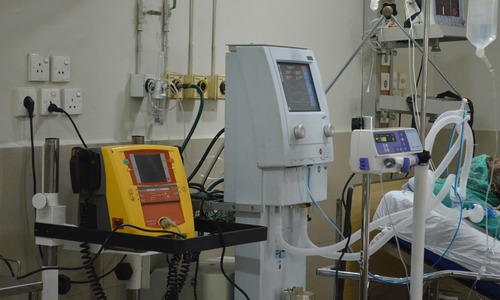ISLAMABAD/RAWALPINDI: Prisoners were released from police lock-ups and Rawalpindi Central Jail in Adiala on Saturday in order to prevent the spread of the novel coronavirus in the twin cities.
A committee constituted under the directions of the Islamabad High Court (IHC) released 230 prisoners on Saturday in order to prevent the spread of the virus in the overcrowded Adiala jail.
The committee, which is led by Islamabad Deputy Commissioner Hamza Shafqaat and includes Additional Deputy Commissioner Waseem Khan, civil judges Raja Mujahid Rahim and Salman Badar, Deputy Superintendent (Legal) of Police Azhar Shah, examined cases of prisoners related to the IHC’s jurisdiction.
IHC Chief Justice Athar Minallah on Friday issued the directives while taking up a petition based on a report by the court’s judicial branch on Islamabad-based under-trial prisoners.
The report said that while the authorised occupancy of Adiala jail is 2,174, the present number of people held in the jail is 5,001. The number of under-trial prisoners whose cases are pending in courts under the IHC’s jurisdiction is 1,362. Most of the incarcerated under-trial prisoners are alleged to have committed offences that fall within the ambit of the non-prohibitory clause.
IHC advises litigants, citizens not to visit premises except in extreme hardship cases
The court observed that prisoners are vulnerable and exposed to suffer irreparably in case of an outbreak. Prisoners are overcrowded, with high turnover and intolerable living conditions, and could potentially become epicentres of the coronavirus outbreak, it said.
The federal government has therefore adopted a policy to reduce the prison population in order to meet the challenge of coronavirus. In compliance with the court’s directions, the district administration released 230 prisoners after deliberations.
Mr Shafqaat said all the people released were arrested for petty crimes such as begging,wandering,possession of an illegal weapon and dishonoured cheques. He added that they were all released against personal sureties.
The committee will meet again today (Sunday) to further fine-tune the list of under-trial prisoners, and some more may also be released, he said.
On Friday, the administration told Justice Minallah that pursuant to the declaration of a Public Emergency of International Concern by the World Health Organisation regarding the outbreak of the coronavirus, the government has made a comprehensive national plan.
When asked about the policy for incarcerated people, particularly those whose cases are pending in courts under the IHC’s jurisdiction, he said it was to reduce the number of inmates and regulate the visitation of prisoners who cannot be released.
The IHC will take up the matter again on March 24.
The IHC has also advised litigants and citizens not to visit the court except in extreme hardship cases. Litigants have also been told to obtain information from the court website instead of visiting offices in person.
According to a public notice issued by the IHC, these measures are part of a social distancing strategy taken to protect judges, lawyers, litigants, court staff and others from the spread of the novel coronavirus.
Only lawyers whose cases are being heard may come to court, the notice said. Government officials and other respondents should come if their attendance is required by the court or if they have been formally summoned.
The IHC issued social distancing guidelines on March 17, under which the district judiciary was advised not to hear routine cases and judges told to visit jail premises to grant or consider bail matters or judicial remand for accused individuals.
In Rawalpindi, the police have decided to release all the suspects arrested for bailable offences in order to combat the spread of the coronavirus.
City Police Officer (CPO) Mohammad Ahsan Younas toldDawnthat it was decided to release everyone held in police station lock-ups after accepting their bail, instead of sending them to judicial prisoners which are already overcrowded.
He said the exact number of suspects released will be known when the process is complete.
He said the police have the power to release everyone arrested for bailable offences, but typically sends people to jail rather than allowing the concerned station house officer to accept their bail.
There are a large number of people arrested for begging and other minor offences held in lock-up at police stations.
The police have already taken other precautionary measures, including distributing masks and gloves among personnel. All individuals, including police, are checked with temperature guns at the entrance gate of police establishments in Rawalpindi districts.
Published in Dawn, March 22nd, 2020













































